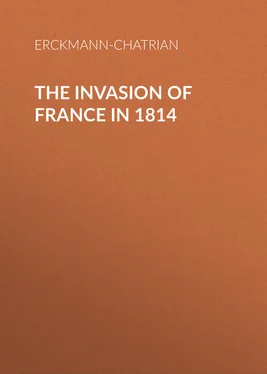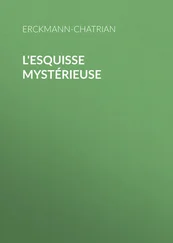Erckmann-Chatrian - The Invasion of France in 1814
Здесь есть возможность читать онлайн «Erckmann-Chatrian - The Invasion of France in 1814» — ознакомительный отрывок электронной книги совершенно бесплатно, а после прочтения отрывка купить полную версию. В некоторых случаях можно слушать аудио, скачать через торрент в формате fb2 и присутствует краткое содержание. Жанр: foreign_antique, foreign_prose, Историческая проза, на английском языке. Описание произведения, (предисловие) а так же отзывы посетителей доступны на портале библиотеки ЛибКат.
- Название:The Invasion of France in 1814
- Автор:
- Жанр:
- Год:неизвестен
- ISBN:нет данных
- Рейтинг книги:3 / 5. Голосов: 1
-
Избранное:Добавить в избранное
- Отзывы:
-
Ваша оценка:
- 60
- 1
- 2
- 3
- 4
- 5
The Invasion of France in 1814: краткое содержание, описание и аннотация
Предлагаем к чтению аннотацию, описание, краткое содержание или предисловие (зависит от того, что написал сам автор книги «The Invasion of France in 1814»). Если вы не нашли необходимую информацию о книге — напишите в комментариях, мы постараемся отыскать её.
The Invasion of France in 1814 — читать онлайн ознакомительный отрывок
Ниже представлен текст книги, разбитый по страницам. Система сохранения места последней прочитанной страницы, позволяет с удобством читать онлайн бесплатно книгу «The Invasion of France in 1814», без необходимости каждый раз заново искать на чём Вы остановились. Поставьте закладку, и сможете в любой момент перейти на страницу, на которой закончили чтение.
Интервал:
Закладка:
"No, they came from Saverne this morning; in an hour or two, when the horses are rested, they will leave for Sarrebourg."
At that moment, the old sergeant, who had re-established order in the carts, came in rubbing his hands.
"Hé! hé!" said he, "it freshens, Papa Wittmann. You did well to light the fire in the stove. A little glass of cognac to drive away the fog. Hum! hum!"
His small half-closed eyes, his beaked nose, the cheek-bones being separated from it by two flourishing wrinkles, which were lost to sight in a long reddish imperial – everything looked gay in his face, and told of a jovial, kind disposition. It was a regular military face, scorched, burnt by the open air, full of frankness, but also of a cheery slyness; his great shako, his blue-gray cloak, the shoulder-belt, the epaulette, seemed to partake of his individuality. One could not have represented him without them. He walked up and down the room, continuing to rub his hands, while Wittmann poured him a glass of brandy. Hullin, seated near the window, had at once noticed the number of his regiment – 6th Light Infantry. Gaspard, the son of Madame Lefèvre, served in this regiment. Jean-Claude could now obtain some tidings of the lover of Louise; but, as he was going to speak, his heart beat loud. If Gaspard was dead; if he had perished like so many others!
The worthy shoemaker felt nearly suffocated; he kept silent. "Better to know nothing," thought he. However, a few minutes later, he could do so no longer. "Sergeant," said he, in a hoarse voice, "you are in the 6th Light Infantry?"
"Yes, my citizen," said the other, turning round in the middle of the room.
"Do you know one called Gaspard Lefèvre?"
"Gaspard Lefèvre, of the 2d division of the 1st? Parbleu, if I know him! It is I who taught him his drill. A brave soldier! hardened against fatigue. If we had a hundred thousand of that stamp – "
"Then he lives? he is well?"
"Yes, citizen. Eight days ago I left the regiment at Fredericsthal to escort this convoy of wounded. You understand, it is hot there – one cannot answer for anything. From one moment to the other, each of us may have his business settled for him. But eight days ago, at Fredericsthal – the 15th December – Gaspard Lefèvre still answered to the roll-call."
Jean-Claude breathed. "But then, sergeant, have the goodness to tell me why Gaspard has not written to his village for two months?"
The old soldier smiled, and blinked his little eyes. "Ah! now, citizen, do you then believe that one has nothing else to do on the march but to write?"
"No. I have served; I was in the campaigns of Sambre-et-Meuse, of Egypt and Italy, but that did not prevent me from giving some news of myself."
"One instant, comrade," interrupted the sergeant. "I have passed through Egypt and Italy also; the campaign we are finishing is altogether different."
"It has then been very severe?"
"Severe! one must have one's soul driven into every part of one's members, so as not to leave one's bones there. All was against us: sickness, traitors, peasants, townsfolk, our allies – in fact all! From our company, which was complete when we quitted Phalsbourg, the 21st of last January, only thirty-four men remain. I believe Gaspard Lefèvre is the only conscript left. Those poor conscripts! they fought well; but they were not accustomed to endure hardships: they melted like butter in an oven." So saying, the old sergeant approached the counter and drank his glass off at one draught. "To your health, my citizen. Are you perchance the father of Gaspard?"
"No, I am a relation."
"Well, you can pride yourselves on being stoutly built in your family. What a man at twenty! He has gone through everything – he has, while the others fell away in dozens."
"But," rejoined Hullin, after an instant's silence, "I cannot see anything so very different in this last campaign; for we also had sickness and traitors."
"Anything different!" exclaimed the sergeant. "Everything was different! Formerly, if you have gone through the war in Germany, you ought to remember that, after one or two victories, it was over: the people received you well; one drank the little white wines, and ate sauerkraut and ham with the townsfolk; one danced with the buxom wives. The husbands and grandpapas laughed heartily, and when the regiment left, everybody cried. But this time, after Lutzen and Bautzen, instead of feeling kindly, the people regarded us with diabolical faces; we could get nothing out of them but by force; one could have fancied one's self in Spain or Vendée. I do not know what stuff they had in their heads against us. Better had we only been French, had we not had Saxons and other allies, who only awaited the moment to spring at our throats: we should then have pulled through all the same, one against five! But the allies – don't talk to me of the allies! Why, at Leipzig, the 18th of October last, in the hottest part of the battle, our allies turned against us and shot at us from behind; those were our good friends the Saxons. A week later, our former friends the Bavarians came and threw themselves across our retreat: we had to pass over them at Hanau. The day after, near Frankfort, another column of good friends presented themselves, and we had to crush them. The more one kills, the more they come! Here we are now this side of the Rhine. Well, there are decidedly more of these good friends marching from Moscow. Ah! if we could have foreseen it after Austerlitz, Jena, Friedland, Wagram!"
Hullin had become very thoughtful. "And now how do we stand, sergeant?"
"We have had to repass the Rhine, and all our strongholds on the other side are blockaded. The 10th of November last the Prince of Neufchâtel reviewed the regiment at Bleckheim. The 3d battalion had been amalgamated with the 2d, and the 'cadre' received orders to be in readiness to leave for the depot. Cadres are not wanting, but men. As for twenty years we have been bled on all sides, it is not astonishing. All Europe is down upon us. The Emperor is at Paris; he is laying down a plan of the campaign. If we may only have breathing time till the spring – "
Just then Wittmann, who was standing by the window, said, – "Here is the governor come from inspecting the clearings around the town."
It was the commandant, Jean-Pierre Meunier, wearing a three-cornered hat, and a tricolor scarf around his waist, who crossed over the square.
"Ah," said the sergeant, "I must get him to sign my papers. Pardon, citizen; I must leave you."
"Do so, sergeant; and thank you. If you meet Gaspard, tell him that Jean-Claude Hullin embraces him, and that they expect tidings from him in the village."
"Good – good. I will not fail to do so."
The sergeant went out, and Hullin finished his wine in a reverie.
"Father Wittmann," said he, after a pause, "what of my parcel?"
"It is ready, Master Jean-Claude." Then, looking into the kitchen, "Grédel! Grédel! bring Hullin's parcel."
A little woman appeared, and put down on the table a roll of sheepskins. Jean-Claude passed his stick through it, and lifted it over his shoulder.
"What, you are going to leave us so soon?"
"Yes, Wittmann. The days are short, and the roads difficult through the forests after six o'clock. I must get back early."
"Then a safe journey to you, Master Jean-Claude."
Hullin left, and crossed the square, turning away his face from the convoy, which still remained before the church.
The innkeeper from his window watched him hurrying away, and thought to himself, "How white he looked on entering; he could hardly keep upright. It is queer that such a sturdy man, and an old soldier too, should not have energy enough for a cat. As for me, I would see fifty regiments go by on those carts without minding it any more than I did my first pipe."
Читать дальшеИнтервал:
Закладка:
Похожие книги на «The Invasion of France in 1814»
Представляем Вашему вниманию похожие книги на «The Invasion of France in 1814» списком для выбора. Мы отобрали схожую по названию и смыслу литературу в надежде предоставить читателям больше вариантов отыскать новые, интересные, ещё непрочитанные произведения.
Обсуждение, отзывы о книге «The Invasion of France in 1814» и просто собственные мнения читателей. Оставьте ваши комментарии, напишите, что Вы думаете о произведении, его смысле или главных героях. Укажите что конкретно понравилось, а что нет, и почему Вы так считаете.












